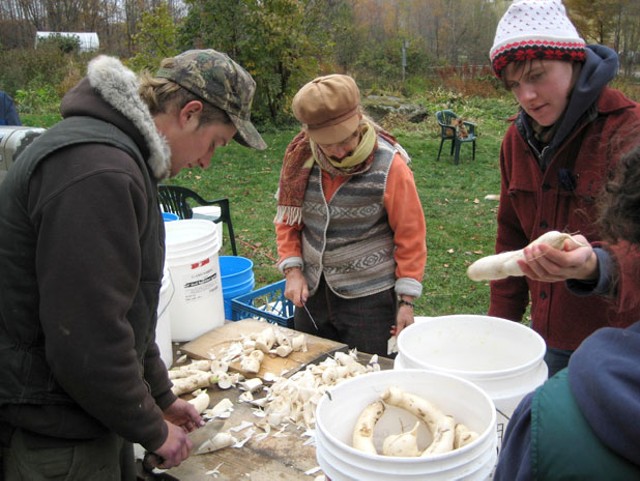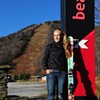Published November 4, 2009 at 6:33 a.m.
It’s daikon-chopping time at Flack Family Farm, and Katy Bauer and Mary Teuscher are getting into it. With expertly sharpened knives, the women hack off the rotten bits of the Asian radishes and slice the vegetables into chunks the size of cupcakes. Those pieces get tossed in a bucket in the middle of the long cutting table.
Though the sky is gloomy, it looks like the weather is going to hold, at least over the Enosburg farm. That’s good for Bauer and Teuscher, whose volunteer experience would be significantly dampened by a downpour. The pair, along with three other volunteers, are set up at cutting boards on a table on Doug Flack’s porch, where they’ll keep chopping, rain or shine. Days before, the skies opened up and the crew had to cut cabbage in the rain.
Once the bucket of daikon is full, Vidar Zay, one of Flack’s three employees, passes it to Lori Niederer, who is staffing the Robot Coupe R2 Ultra shredder. Niederer drops the daikon into the machine, which spits out neat slivers of cream-colored radish. The slivers are toted to the basement of Flack and his wife Barbara’s red clapboard farmhouse, which is where the magic happens.
Well, it’s not so much magic as it is science. For the past 10 years, Flack’s stock-in-trade has been lacto-fermented vegetables such as sauerkraut, kimchi and a daikon/cabbage/ginger mix. The 67-year-old farmer was talking about fermentation long before it became de rigueur in the health-food world.
Flack’s food is “alive,” he says, and therefore all the better for you. The six-week fermentation process yields fare high in healthy enzymes and lactobacilli, the same good bacteria found in yogurt.
Lacto-fermented vegetables aren’t the 60-plus-acre farm’s only product. Flack milks a herd of American Milking Devons, raises grass-fed beef and pork, and harvests medicinal herbs for tinctures. But he’s known best for his Flack Family Farm organic, fermented vegetables, which are sold at food co-ops around the region.
Making sauerkraut, kimchi or, on this October day, the daikon mix is laborious. Each cabbage and radish is hand-cut before it is shredded. Once it’s shredded, it’s dumped in a vat with handfuls of ginger and Celtic sea salt, mixed by hand and pounded with a 2-and-a-half-foot maplewood pestle to release the vegetables’ juices.
Since Flack is making 8 tons of the fermented vegetables this year, it’s impossible for him to manage it all, even with the help of Zay and his other two employees. So Flack does what people used to do when they needed help with harvesting or processing — he asks his neighbors. But nowadays, “neighbor” is a broad term.
Every year since he began making the fermented vegetables, Flack has solicited volunteers to help with the production by word of mouth, on the Internet and at local food events. Those who show up get to learn how to make their own sauerkraut and kimchi, and Flack meets his production demands. Volunteers who put in a full day of work — generally 8 a.m. to 3 p.m. — leave with a five-gallon bucket of fermented vegetables they helped make.
It’s a good trade-off for volunteers Bauer and Teuscher, who drove up from Shoreham to learn the lacto-fermenting process from the master. Both say they’ve known about Flack’s volunteer production days for a while and wanted to check them out.
Flack recognizes that when volunteers leave the farm with the skills to reproduce his process in their own kitchens, he’s essentially losing customers. But it’s part of spreading the gospel of lacto-fermentation. “We meet a lot of people, and we spread the idea that you can be in charge of a lot yourself,” Flack says. “I’m sending away a customer, but the real effect is, you build community. You educate people and you educate yourself.”
Flack, who has a PhD in zoology and botany, came to the farm in 1976 after working for six years in New Zealand protecting rare birds. That experience inspired him to enter the farming fray. He chose Vermont because of its biodiversity and its reputation for being a live-and-let-live type of place, he says.
While he built his house, his family lived in lean-tos and tents. They were unconventional, but in the mid-1970s, Flack recalls, such eccentricities were embraced. “People were very receptive to us,” Flack says. “Our neighbors turned out to be the best teachers and helpers.”
At the moment, the best helpers are the cadre of volunteers assisting Flack with his production. After slicing daikon, Bauer and Teuscher head down to the basement, where Nick Geilen is waiting to teach them how to pound the mixture. Gypsy folk music blares as Geilen throws handfuls of chunky, gray sea salt and ground ginger into big, blue barrels of purple and white cabbage and daikon. The piquant tang of fermenting cabbage is heavy in the air.
Geilen tells Teuscher to grab some rubber kitchen gloves and start mixing the ingredients into a slaw. Once the barrel’s contents are sufficiently blended, each woman takes a wooden pestle, which she’s instructed to mash into the vegetables. The pestle is cudgel-like and slightly intimidating.
Geilen, a stonemason by trade, explains that the daikon mix requires less pounding than sauerkraut to release its juices. Bauer and Teuscher raise their pestles and plunge them into the mix, over and over again. “It’s definitely a workout,” says Bauer, who works at Champlain Orchards and is no stranger to physical labor.
Making lacto-fermented vegetables is no more complicated than that. The vegetables ferment in their juices for six weeks and are then transferred to jars and housed in cold storage. The product can last on the shelf for up to two years.
But volunteers don’t come for the challenge; they come for the community. Niederer, of Fairfield, decided to help out as a way to meet other people. “I was always yapping about how there was no community up here anymore. So I figured I better do something about it rather than yakking about it,” Niederer says as she runs daikon through the Robot Coupe.
Had Carrie Kittell-Mitchell, of Sheldon, never volunteered at the Flack farm, she probably never would have come in contact with someone like Zay, a 23-year-old nonconformist and self-described traveler who, with Geilen, is renovating a cabin not far from Flack’s property. But as Zay cuts cabbage, his hands stained purple from the juice, he talks with Kittell-Mitchell about his plans for the cabin. Kittell-Mitchell, a youthful-looking grandmother, frets over whether Zay will be warm enough there during the long Vermont winter.
Kittell-Mitchell grew up on a dairy farm; though her family still operates a sugarbush, she misses this kind of camaraderie. The good conversation makes the work go quickly and reminds her of what she loves about rural Vermont. “It was just a calling to be here,” she says. “You meet such interesting people.”
Flack takes his job of fostering community one step further and feeds all his volunteers a hearty lunch around his own kitchen table. Nearly all of the food comes from the farm and is cooked by the always-smiling Zay. On a recent production day, volunteers noshed on roasted potatoes, cooked carrots and onions, steak, cucumber salad, the daikon mix and some late-season watermelon. The only thing that Flack didn’t grow or raise was the brown rice. That spurred a conversation about the politics of local eating and the contemporary agricultural system.
Flack is a slight man with a reddish, wind-whipped face and hands gnarled from years of work. His funky green glasses are more hipster than farmer. He sits at the head of the table looking sagacious, dispensing wisdom gained during his 33 years spent farming and living in a rural community. He sounds off about the link between the degraded agricultural system and the growing national health crisis. He quotes Thomas Jefferson and draws parallels between the ancient Roman war economy and our current industrial farm complex.
The assembled eat and listen to Flack, rapt. It’s easy to see what draws the volunteers to the farm. Working there offers a chance to learn a new skill, commune with others, participate in the rural economy and absorb the teachings of a man who seems to have it all figured out.
As soon as lunch is over, the workers pile their dishes around the kitchen sink and head back out to the porch to chop cabbage or trudge down to the basement to mash the daikon mix. Zay and Flack’s dogs, Pico and Buster, who have been lounging in the front yard, are happy the crew has returned. They wag their tails and sniff around the compost buckets, more interested in their human companions than the spicy vegetables. The shredders hum and the conversation resumes. The pile of cabbages in the bed of the truck grows smaller as another day on the farm steadily marches toward completion.
More By This Author
Speaking of Food, localvore Movement
-

Q&A: Howard Fisher Delivers Meals on Wheels With a Side of Good Cheer
Dec 20, 2023 -

Video: Howard Fisher Delivers Meals on Wheels
Dec 14, 2023 -

Q&A: Alexis Dexter Rescued 57 Shelter Cats During the July Flood
Sep 13, 2023 -

Video: Two Months After the Flood, Alexis Dexter Rebuilds Kitty Korner Café in Barre and Continues to Rescue Cats
Sep 7, 2023 -

Video: Saying Goodbye to Burlington’s Penny Cluse Café
Nov 17, 2022 - More »
Comments
Comments are closed.
From 2014-2020, Seven Days allowed readers to comment on all stories posted on our website. While we've appreciated the suggestions and insights, right now Seven Days is prioritizing our core mission — producing high-quality, responsible local journalism — over moderating online debates between readers.
To criticize, correct or praise our reporting, please send us a letter to the editor or send us a tip. We’ll check it out and report the results.
Online comments may return when we have better tech tools for managing them. Thanks for reading.















































